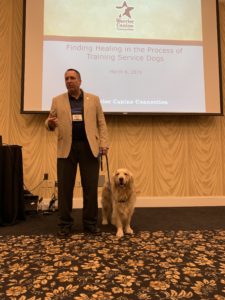Rick Yount, WCC founder and ED, Presents at 3rd Annual West Virginia Conference on Trauma Brain Injury
 March 6, 2019 – More than 200 survivors of traumatic brain injury (TBI), their family members and caregivers, and service providers are gathered in Daniels, West Virginia for the 3rd Annual West Virginia Conference on TBI. Among the speakers on the agenda is Warrior Canine Connection Founder and Executive Director Rick Yount, who was invited back to speak for the second year in a row.
March 6, 2019 – More than 200 survivors of traumatic brain injury (TBI), their family members and caregivers, and service providers are gathered in Daniels, West Virginia for the 3rd Annual West Virginia Conference on TBI. Among the speakers on the agenda is Warrior Canine Connection Founder and Executive Director Rick Yount, who was invited back to speak for the second year in a row.
“I am so delighted to have the opportunity to be here in West Virginia and speak at this conference again,” said Yount. “The amount of practical knowledge, expertise on TBI and resources available to survivors and their family members is really impressive and underscores the availability of options, treatment and, most importantly, hope for the recovery for our Veterans with TBI.”
Themed “From Surviving to Thriving: Growth After a TBI,” topics being covered during the three-day conference center on improving communication, sexual health following a TBI, rehabilitation efforts, self-advocacy, behavioral health and substance abuse, among many other topics.
Of course, Rick’s talk centered on the use of its Mission Based Trauma Recovery training model, whereby Warriors in recovery are enlisted to train service dogs for their fellow Veterans. The training process and subsequent placement of highly trained service dogs can both serve as valuable tools in the TBI recovery process.
The Traumatic Brain Injury (TBI) Program at the WVU Center for Excellence in Disabilities is proud to serve as the state’s designated lead agency for the coordination of services for West Virginians with TBI. The TBI Program is a collaboration between the state funded Traumatic Brain Injury Services and the federally funded Traumatic Brain Injury Implementation Partnership Grant. TBI is defined as a blow or jolt to the head or a penetrating head injury that disrupts the brain’s function. In West Virginia, anoxia due to near drowning is also considered a traumatic brain injury. To date, no other forms of anoxia are considered traumatic in nature in West Virginia.
Learn more about the TBI Program at the WVC Center for Excellence in Disabilities here.


